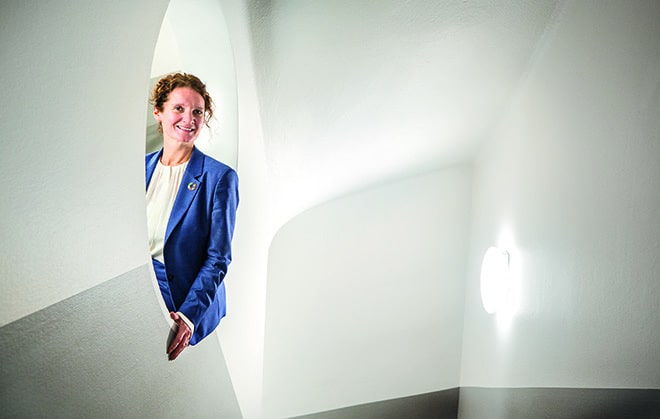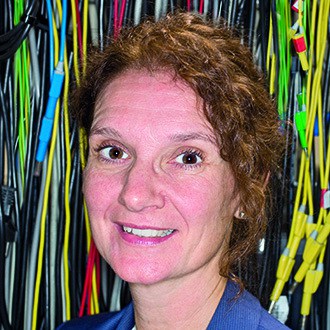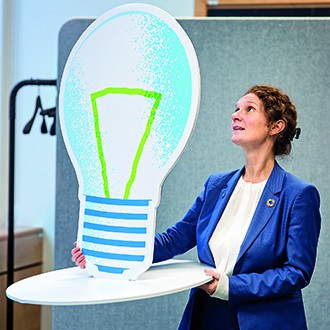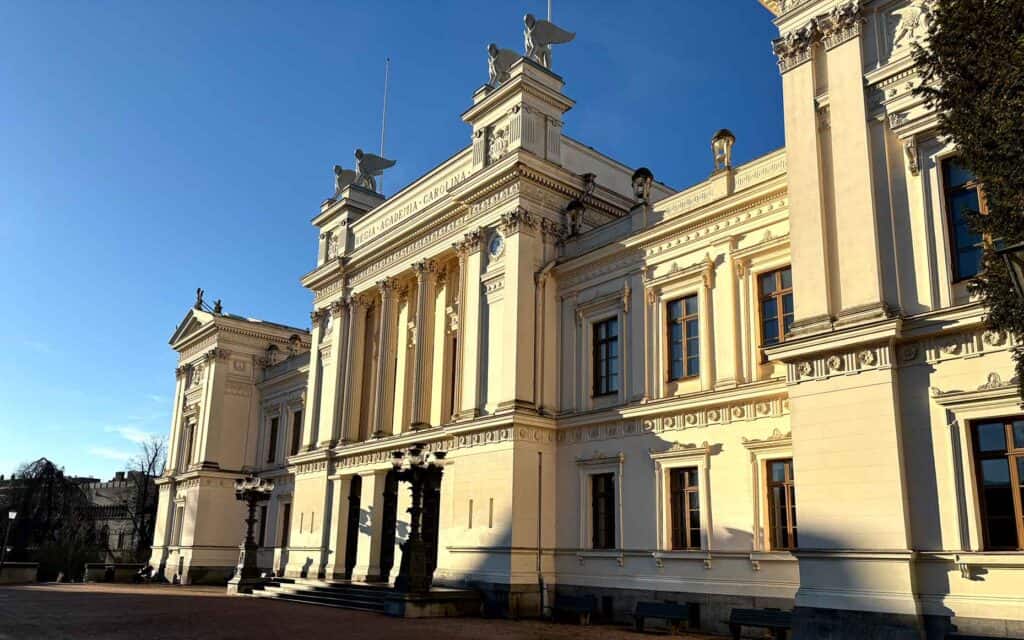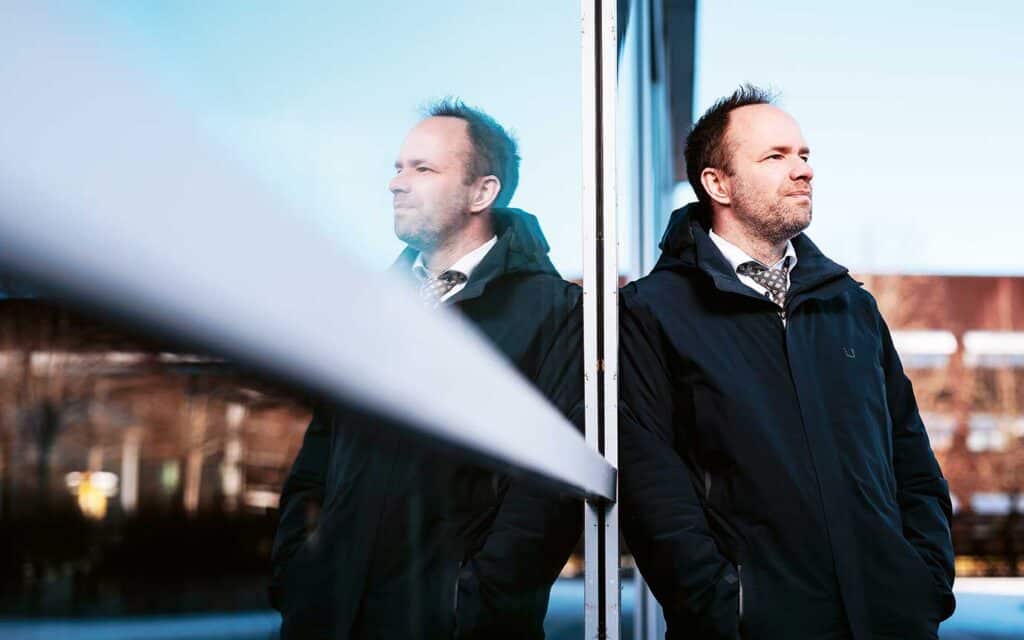“Wow! 30 already. I didn’t expect that.”
Lina Bertling Tjernberg sounds surprised as she looks at her computer screen while giving us a welcoming wave as we enter her office at the Royal Institute of Technology in Stockholm. She is just checking just how many citations she has had so far in 2023 and notes that there are more than expected considering we are only just over a week into January.
She is of course referring to scientific citations, but Lina Bertling Tjernberg is also used to being quoted in mass media. As the energy crisis has worsened, the professor of electric power technology has been interviewed more and more frequently in her role as industry expert. She wants to be a voice of science in the political debate.
“The energy crisis is one of society’s major issues, and it’s no wonder that there is a lot of focus on it. What I’m disappointed about is that, since the election, people have not yet managed to sit down and work together.”
Corrected factual errors in texts
She is concerned that there are “organisations and individuals with ideological agendas which are not based on independent knowledge and facts”.
“In Sweden, we’ve had a movement that took a stand and said ”we don’t like nuclear power”. I try to make it very clear to people that I am an engineer and researcher, and that I am politically independent – and in my opinion we must use the best technology. Recently, on the other hand, there has been a growing resistance to wind power, so I have tried to explain its benefits.”
She tells us that she has helped to correct factual errors in reports and articles on the radio, on television and in newspapers. “It was a rude awakening to discover that ideological stances permeate society. I get frustrated because there’s even propaganda in children’s books, where sources of energy are portrayed as good or bad. It’s misleading to communicate in that way and it feels important to make a contribution by correcting such things.”
Professor at 35
Lina Bertling Tjernberg grew up in Huddinge, just south of Stockholm. Despite her early ambition to be a lawyer, she chose to study a technical programme focused on energy at high school. Her interest in mathematics then led her to apply for an engineering programme in aeronautics and vehicle technology at the Royal Institute of Technology, KTH.
“I gave up all thoughts of studying law. I wanted to work in applied mathematics and solve problems, but my education was very theoretical and the only application was on the military side, so I did my internship at the Swedish Defence Materiel Administration and my degree project was a reliability analysis of the Leopard 2 tank.”
Bertling Tjernberg describes herself as ”a fighter”, something that she showed clearly in the academic world, where she advanced quickly. Following her master’s degree, she became a doctoral candidate at KTH, then docent in 2007 and professor two years later, at the age of 35. In between, she was Director of Research at Svenska kraftnät, the authority responsible for the running of Sweden’s transmission system for electricity, but still based at KTH.
“A professorship came up at Chalmers University of Technology, and there are so few positions to apply for. Although I would have liked to stay longer at Svenska kraftnät, I didn’t want to miss the chance to apply for a professorship in my field of study.”
Differences between KTH and Chalmers
In an interview with Svenska Dagbladet in 2007, Lina Bertling Tjernberg explained that she worked 50 to 60 hours a week and struggled to find work-life balance. Choir singing provided one of the few opportunities for her to switch off from work. After starting a family, she has found a little more balance. First, she stepped down from the managerial role she had at Chalmers, and in 2013 she applied successfully for a professorship at KTH.
Today, she and her husband have two boys, aged six and eight. Those extremely long working weeks are a thing of the past, although she admits that in the past year she has worked more than is sustainable and is trying to reduce her number of assignments. “I usually say that you can have everything, but not at the same time. I had children late in life, and then it was so obvious for me to want to spend time with them. Life is different for everyone, and you have to understand that there is no right or wrong way, just different ways.”
Bathtub curve
She brings up her citations again, saying they follow a ”bathtub curve”. She shows with her hand a high, straight line that goes sharply down and becomes flat before going sharply up again, like a U. Her period of few citations coincides with her early years of parenthood.
“Having children has a rather brutal impact on a research career,” she says. “Having several children in a short time can be a disaster for your career but a fantastic investment in your life. Now we have two boys who have so much fun together and are quite close in age, and it’s a wonderful time.”
Today, one of Lina Bertling Tjernberg’s roles is as Director of the Energy Platform at KTH, which supports interdisciplinary research in the field of energy. “I love being Director of the Energy Platform. I get to inspire collaboration and support initiatives. Right now we are trying to encourage people who work in different fields within solar power to work together, for example from the materials side, chemistry and electrolysis. We are an inclusive platform for collaboration and exchange for all researchers with an interest in energy, with the goal of creating new solutions and being part of the energy transition.”
However, she sees the funding system as a constraint on creative collaborations. “The system for applying for money is pretty tragic. We have to spend an enormous amount of time writing applications exactly as the funders intended and submitting them in a specific format. And then almost 80 per cent of applications are rejected because there’s not enough money available. I think it’s terrible and would love to see huge changes.”
Electric cars and planes
Her own research focuses on two main areas. One concerns the stability of electricity supply at system and component level, while the second is about creating flexibility in the electricity grid, where she has built models to study local solar electricity production and storage in batteries. One area she has worked with and would like to develop further is electric cars. As she has studied aviation, she is also interested in the development of electric aircraft.
Bertling Tjernberg has divided up her year so that she teaches in the autumn term and does research in the spring. She also supervises visiting researchers and doctoral candidates. “The most important thing I want to convey to them is passion for the subject. After that, it is important to be determined and work persistently, to be thorough and to document everything.”
Elected in IVA
She has continued to turn down management positions, not least in order to be able to spend time on the role of expert, in which she has seen evidence of her impact. Just before Christmas, she was elected as a new member of the Royal Swedish Academy of Engineering Sciences, IVA, and in 2021, she received the ”Power Woman of the Year” award, with the jury declaring that she is ”a powerful force and guarantor of a greater competence gender balance within today’s and tomorrow’s sustainable energy system”. The award is presented annually by the organisation Kraftkvinnorna as part of its efforts to raise awareness of the role of women in the energy sector.
“That meant a lot to me,” she says. “The jury’s announcement was a powerful statement and gave me even more energy to fight on.”
What drives Lina Bertling Tjernberg in her scientific work is to bring about change, and she has understood that it is not a question of how productive she is. “What matters is not whether you have published 100 or 200 articles, but whether anyone actually reads them. That’s why I enjoy looking at citations, because they mean that someone has read what I’ve written and is using it. Citations are like an artist’s painting – you know someone has it in their home and that makes you happy.”
